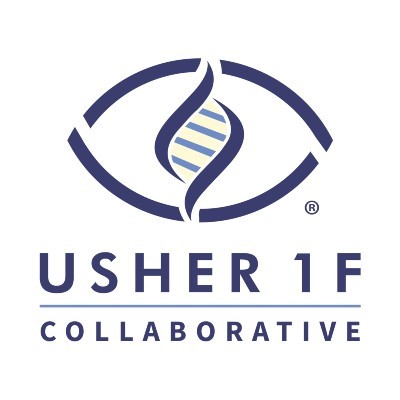
Harvard Medical School
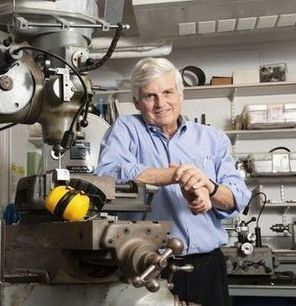
Dr. David Corey, Harvard Medical School
David Corey, PhD, is the Bertarelli Professor of Translational Medical Science, Blavatnik Institute of Neurobiology, Harvard Medical School. After years of studying the role of protocadherin 15, the Usher 1F gene, in hearing, he decided to pursue research on treating the vision loss of Usher 1F after attending Usher 1F Collaborative's May 2017 researchers symposium. Dr. Corey is working on three approaches to gene therapy, mini genes, split genes, and gene editing, with his mini gene the most advanced and demonstrating very promising results in preclinical testing. We are very grateful to the Bertarelli Foundation, Foundation Fighting Blindness, and the Blavatnik Family Foundation for providing a substantial amount of funding for Dr. Corey's Usher 1F work.
For more about Dr. Corey's research, click here.
To watch a presentation by Dr. Corey about his Usher 1F research, click here.
For more about Dr. Corey, click here.
To read more about Dr. Corey's Usher 1F gene therapy, click here, here and here.
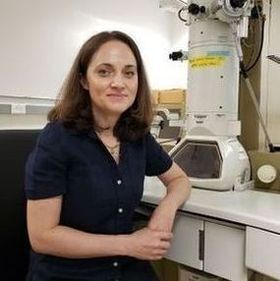
Maryna Ivanchenko, MD, PhD
To read an interview with Maryna Ivanchenko, MD, PhD, who has spearheaded much of the Usher 1F research in Dr. Corey's lab, click here.
Publications
Mini-PCDH15 gene therapy rescues hearing in a mouse model of Usher syndrome type 1F
Rescue of hearing by adenine base editing in a humanized mouse model of Usher syndrome type 1F
PCDH15 Dual-AAV Gene Therapy for Deafness and Blindness in Usher Syndrome Type 1F
PCDH15 Dual-AAV Gene Therapy for Deafness and Blindness in Usher Syndrome Type 1F Models
Mini-Pcdh15b Gene Therapy Rescues Visual Deficits in a Zebrafish Model of Usher Syndrome Type 1F
University of Oregon Institute of Neuroscience
Monte Westerfield, PhD, is at the Institute of Neuroscience and Department of Biology at the University of Oregon. His research is focused on Usher Syndrome with particular expertise in creating zebrafish models of Usher Syndrome mutations. Usher 1F Collaborative has funded the creation of a zebrafish model of the Usher Syndrome Type 1F R245X mutation that is carried by ~2% of those of Ashkenazi Jewish descent. Dr. Westerfield and his team, including Jennifer Phillips, Ph.D., are now beginning testing of drugs on our zebrafish that have the potential to halt or slow the progression of vision loss.
For more about Dr. Westerfield’s research, click here.
For more about Dr. Westerfield, click here.
Click here to view a presentation explaining and outlining the progress of the work of Dr. Monte Westerfield and his lab associates that Jennifer Phillips, Ph.D., presented at the Usher Syndrome Family Conference in Seattle on July 9, 2016.
Click here to watch an Usher Syndrome Coalition USH Talk with University of Oregon Usher 1F researcher Jennifer Phillips, Ph.D., on gene therapy for Usher Syndrome.
Click here to read an interview with Jennifer Phillips, PhD., on what drives her to continue her Usher 1F research.
PHOTO CREDIT: (Photo at top of the page) Courtesy of University of Oregon
Publications
The Salk Institute

Samuel Pfaff, PhD
The Salk Institute
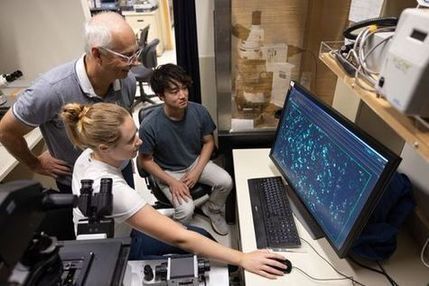
Pfaff Lab, Salk Institute: Sam Pfaff, Claire Williams, Ryan Hsu
Samuel Pfaff, PhD, and his team at the Salk Institute for Biological Studies in La Jolla have developed a novel RNA joining technology to enable a new generation of gene therapies for large genes. In the work funded by Usher 1F Collaborative, they are developing and testing a PCDH15 gene replacement approach for the treatment of Usher 1F. Click here to read more about Dr. Pfaff's research.
University of Maryland School of Medicine
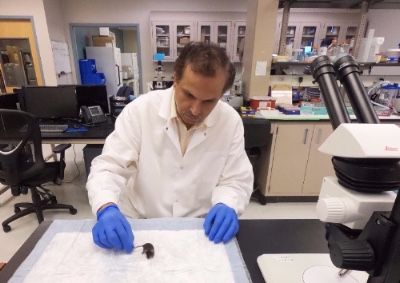
Dr. Ahmed working with an Usher 1F mouse
Zubair Ahmed, PhD, at the University of Maryland, has developed a mouse model of the most prevalent Usher 1F mutation that he is now using to test potential gene therapies developed by Drs. Carvalho and Byrne, as well as potential drug therapies.
For more about Dr. Ahmed’s research, click here.
For more about Dr. Ahmed, click here.
Publications
University of Toronto
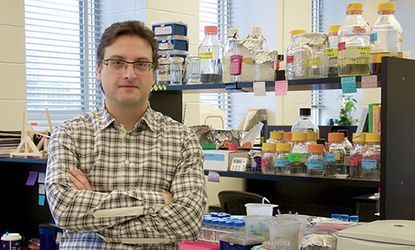
Dr. Vincent Tropepe, University of Toronto
Vincent Tropepe, PhD, is a professor in the Department of Cell & Systems Biology and Vice Dean of Research in the Faculty of Arts & Science at the University of Toronto. He received his BSc from McMaster University, his PhD from the University of Toronto, and trained as a CIHR Postdoctoral Fellow at the Whitehead Institute for Biomedical Research at MIT. In early 2020, Dr. Tropepe received a two-year grant from Fighting Blindness Canada for his project Function of Usher Syndrome protein PCDH15 in photoreceptor maintenance. PCDH15 is the gene on which mutations are responsible for Usher 1F. Dr. Tropepe has developed a zebrafish model to study why and how mutations in the PCDH15b gene cause photoreceptor cell death and if gene therapy can help restore vision. In 2021, Usher 1F Collaborative awarded Dr. Tropepe a grant to further his Usher 1F research.
For more about Dr. Tropepe's research, click here.
For more about Dr. Tropepe, click here.
University of Western Australia
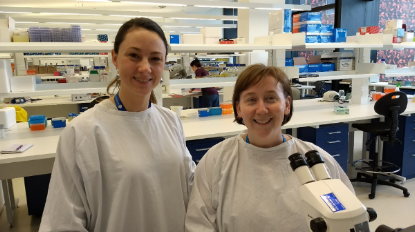
Dr Livia Carvalho (left) and Dr Paula Fuller-Carter (right) in the lab at the Lions Eye Institute, Perth, Australia.
Livia Carvalho, PhD, at the University of Western Australia, is collaborating with Dr. Ahmed to develop gene replacement therapy for Usher 1F. She has developed a dual vector gene replacement therapy, which Dr. Ahmed is testing for efficacy on our mouse.
For more about Dr. Carvalho’s research, click here.
For more about Dr. Carvalho, click here.
University of Pittsburgh School of Medicine
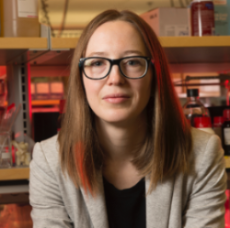
Dr. Leah Byrne
Leah Byrne, PhD, at the University of Pittsburgh is developing a split gene dual vector system for gene replacement. Her unique approach increases the efficiency of viral vector co-infection, increasing efficacy of large gene expression. Once complete, Dr. Ahmed will test her vectors for efficacy on our mouse.
For more about Dr. Byrne's research, click here.
For more about Dr. Byrne, click here.
University of Iowa, Institute for Vision Research
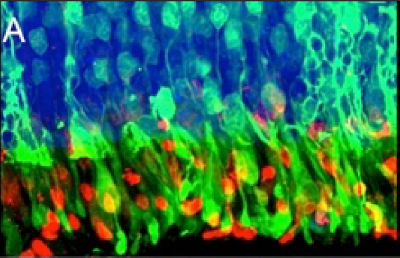
Human donor retina used to facilitate development of large capacity vectors for Usher Syndrome gene therapy
Edwin Stone, MD, PhD, who is working to develop a cure for Usher 1F along with other types of retinitis pigmentosa at his lab at the University of Iowa, is working to halt further retinal degeneration from Usher 1F through gene replacement and to repair damage that has already occurred through replacement of damaged retinal photoreceptor cells with new cells made from the patient’s own skin cells, with a goal of a clinical trial once safety and efficacy are determined.
For more about Dr. Stone’s research, click here and here.
For more about Dr. Stone, click here.
Centre for Eye Research Australia
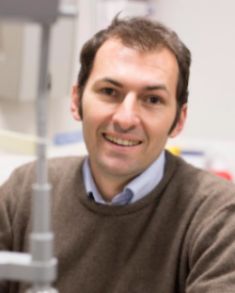
Dr. Alex Hewitt
Alex Hewitt, MBBS, PhD, is a Principal Research Fellow at the Menzies Institute for Medical Research and the School of Medicine at the University of Tasmania, as well as Principal Investigator at the Centre for Eye Research Australia. He is also a practicing ophthalmologist. Working with our partner family in Melbourne, Australia, Dr. Hewitt obtained a grant from the Australian government for his Usher 1F research and, using this money, is working on gene editing to effectively treat the vision loss of Usher 1F.
For more about Dr. Hewitt's research, click here.
For more about Dr. Hewitt, click here.
